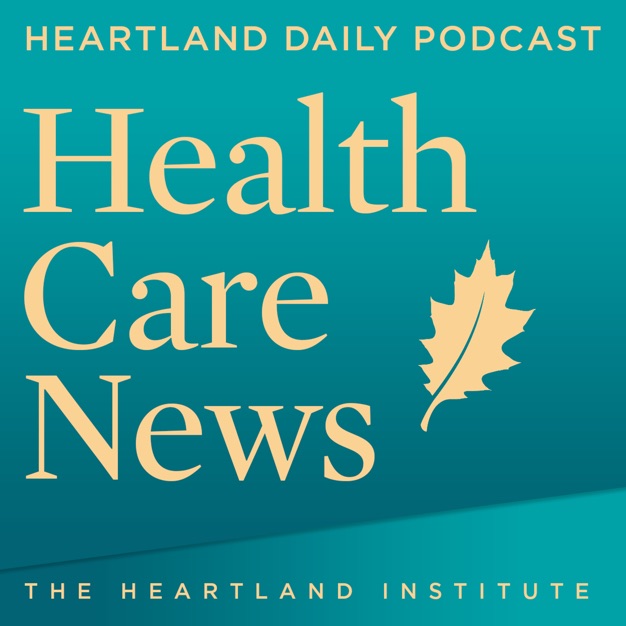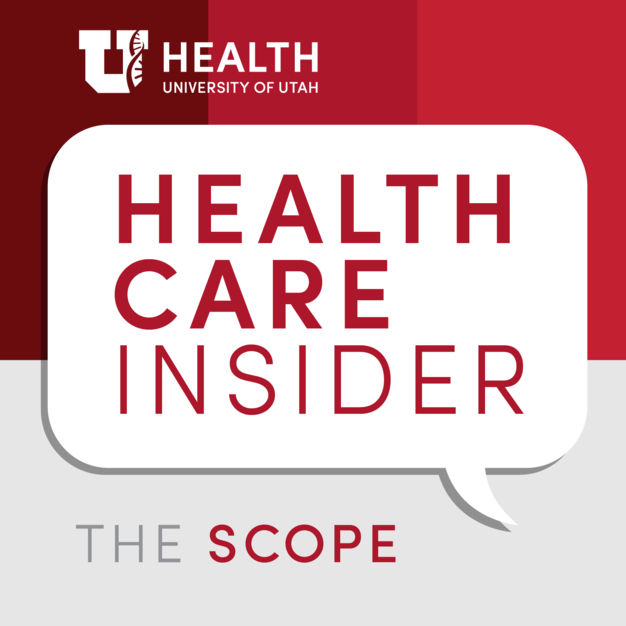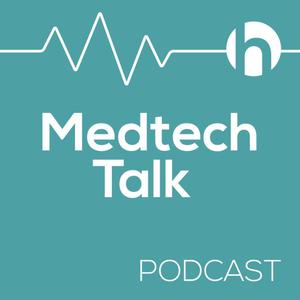
Health Care News Podcast
Heartland Institute
The Heartland Institute podcast featuring libertarian and conservative health care scholars who are working to put power back into the hands of patients and doctors, and away from government bureaucrats.
- 26 minutes 56 secondsObamacare's Olympian Premiums – "I couldn’t afford it," says Mary Lou Retton (Guest: Kansas State Sen. Beverly Gossage)
Olympian Mary Lou Retton made a stunning revelation when asked why she didn’t have health insurance while she was in intensive care fighting for her life. “I couldn’t afford it,” Retton told the Today Show on January 8 when she was faced with a life threating pneumonia recently. Retton’s daughter started a “Go Fund Me” page to help her mother pay for what was likely to be tens of thousands of dollars in hospital bills.
Health Care News managing editor AnneMarie Schieber talked to Kansas State Senator Beverly Gossage as to why Retton may have gone without health insurance. The likely answer is Obamacare, the only option for people without an employer health plan. Gossage discusses what Retton might have paid for an Obamacare plan without subsidies and why there are almost no other options today for middle income people. She also discusses what Congress needs to do about it.
PHOTO: ROBIN MARCHANT/GETTY IMAGES NEWS
29 February 2024, 8:40 pm - 23 minutes 53 secondsAre Hospitals Prematurely Ending Life for Organs? – Heidi Klessig, M.D.
You see the reports in the news all the time, a patient on life support has given the “gift of life” by donating organs. Few people realize but organ donors needs to be alive to do this. Hospitals can legally declare people with a brain death diagnosis allowing them to take their vital organs for transplant. Dr. Heidi Klessig is author of The Brain Death Fallacy. She discusses whether brain death is irreversible and how the organ transplant business has grown since the decision in 1968 to include brain function in the legal definition of death.
Klessig: “People defined to be brain dead or dead by neurological criteria have beating hearts, digest food, excrete urine, and even gestate pregnancies and deliver healthy babies. These people are not biologically dead, and their spirits have not departed. Brain death is not death. Many people who were diagnosed as being brain dead have recovered. If brain death was real death, people should not recover even once.”
Klessig also discusses the Uniform Declaration of Death Act, and how New Jersey is the only state that allow families to demand treatment for patients declared “brain dead.” Patients and families can take measures before a crisis to make sure hospitals do not violate their wishes when it comes to life and death issues. For more information, see respectforhumanlife.org
7 February 2024, 9:24 pm - 21 minutes 4 secondsConsumers Have Spent Billions on Decongestants that Don’t Work
In this episode of Health Care News, we delve into the recent revelation by the Food and Drug Administration (FDA) that certain over-the-counter decongestants, specifically those labeled with "PE" (phenylephrine), are no more effective than a placebo. Our guest, Dr. Jeffrey Singer, a practicing surgeon from Phoenix, Arizona, and a senior fellow at the Cato Institute, sheds light on how these medications found their way onto store shelves.
Dr. Singer traces the issue back to the Combat Methamphetamine Epidemic Act (CMEA), enacted 18 years ago in response to the methamphetamine crisis. This legislation pushed pseudoephedrine, an effective decongestant, behind the counter, leading drug companies to modify their formulas to include PE for over-the-counter sales.
Throughout the episode, Dr. Singer discusses several key points:- The factors that led the FDA to reconsider its stance on over-the-counter decongestants.
- An overview of different decongestant drugs and tips for consumers to differentiate them.
- The process for purchasing pseudoephedrine, the effective decongestant.
- An exploration of why the FDA initially overlooked the ineffectiveness of PE.
- The sales strategies of drug manufacturers for OTC decongestants.
- Evaluating the CMEA's impact on the Meth epidemic.
- The potential for a class-action lawsuit against this misleading practice.
- The future: Is there a possibility that Congress will repeal the CMEA?
For further insights, don't miss Dr. Singer’s op-ed in Health Care News, linked in the episode description.
9 January 2024, 9:07 pm - 30 minutes 59 secondsThe Domino Effect of Medicare Hospital Reimbursements on Soaring Health Costs
For years, Medicare has paid hospitals and their affiliates more for services than it has to others. The reasons are complex, but this policy significantly incentivizes hospitals to absorb independent practices, creating “monopolies” that reduce competition and increase prices for everyone. Dr. Richard Kube, M.D., founder and CEO of the Prairie Spine and Pain Institute—an independent practice in Illinois—experiences first-hand how this policy and other top-down government regulations work against patients. Kube, an advocate for “site-neutral” payment, recently discussed this topic in Newsweek.
“Site-neutral payment would end the unfair policies promoting consolidation and encouraging higher prices,” Kube writes. “Such proposals have bipartisan support in Congress. Several congressional committees are currently debating a health reform package, including provisions to establish site neutrality under limited circumstances. This would be an essential first step, one that physicians nationwide hope will soon extend to other services. After all, reimbursing providers equally for the same service is only fair.”
In the podcast, Kube discusses:
- The reasons why Medicare pays more money to hospitals for the same service
- Examples of the differences in costs
- How this policy leads to increased consolidation in the healthcare industry and raises costs for everyone
- The track record of Congress and the administration, including under Trump and Biden, in promoting site-neutral payments
- The influence of the hospital lobby and the feasibility of implementing site-neutral payments
- Actions the public can take to support the advancement of more free-market policies
16 November 2023, 5:43 pm - 26 minutes 41 secondsFour-Year-Old Child Trapped in Hospital Getting Against Parents' Will (Guest: Hope Schacter, Mother)
For almost 4 weeks, four-year-old Autumn Schall has been virtually trapped at Lucile Packard Children’s Hospital, in Palo Alto, CA against the will of her parents. Today, mother Hope Schacter joins the program to discuss Autumn’s situation.
Autumn was admitted to the teaching hospital for an e-coli infection but within days, she became critically ill, receiving care in the ICU, being given intravenously a cocktail of risky drugs, and eventually put on a ventilator. When the parents questioned the treatment, the hospital reported them to Child Protective Services. They are working with advocates and a lawyer to have her moved to another hospital where their daughter won’t be viewed as a “case study,” and the family is treated like an ally not an adversary.
Autumn was referred to Lucile Packard Children’s Hospital for a diagnostic work to examine her bowel after a week-long case of diarrhea. Her bowel was normal, but the hospital diagnosed an e-coli condition and wanted to admit her. After the parents agreed, the hospital proceeded with an aggressive treatment plan including powerful drugs such as Lasix, Diarel, and Aminophalen.
“Their protocol was very aggressive. My daughter was never on Tylenol before. She was never really sick and when they’re throwing all these diuretics at you, and given the side effects these can produce, I just thought it was a lot for her constitution,” said Hope Schacter.
The family has been working with Remnant Nursing advocacy services which has identified multiple ethical and clinical lapses.
Schacter believes the hospital is trying to cover up clinical errors at the beginning of care that damaged her daughter’s kidneys and caused her to have a seizure. They complied with all treatment recommendations, even an MRI, which required intubation. Autumn has also had to undergo a blood transfusion. There was a hearing involving the CPS complaint. The hospital is trying to get the parents to sign off on all intervention deemed “emergency,” but the parents say it has been vaguely defined.
Related Health Care News articles on patient advocacy in hospitals:
Minnesota Legislature Considers ‘Trusted Doctor’ Bill, May 3, 2023
Down Syndrome Patient’s Family Sues Hospital for Do Not Resuscitate Order, June 20, 2023
Judge Plans Three Week Jury Trial in Do Not Resuscitate Case, August 1, 2023
Patient Takes Hospital to Court for Life-Saving COVID -19 Treatment, Feb. 12, 2021
9 November 2023, 11:25 pm - 36 minutes 13 secondsRemoving Medicaid Loopholes to Improve Long-Term Health Care
Stephen Moses, one of the leading experts on long-term care in the U.S., says the nation can dramatically improve the quality of our health care system if we could get rid of the loopholes that allow nearly everyone to qualify for Medicaid coverage. The current system encourages few people save for long-term care because it is widely accepted that the government will pick up the tab. While this may be true, government control limits innovation and leads to worsening health outcomes.
Moses, and the Paragon Institute released their latest report on the problems with long term care in the U.S., called Long-Term Care: The Solution. In October 2022, Moses and Paragon outlined the problems in Long-Term Care: The Problem.
People prefer to live out their final years in the comfort of their own home but surprisingly, many of the elderly end up in institutional care. That is no accident. Medicaid is the largest payer of long-term care, and one reason is because you don’t have to be impoverished to qualify. This has put a huge strain on the federal budget, on Medicaid reimbursements and significantly compromised the quality and supply of care. Few innovations exist because there is little presence of a free market. As a result, institutional care has become the “go-to.”
This podcast begins with a discussion on Medicaid loopholes, the response from Congress, whether a solution is workable immediately, and how special interests might respond to closing off loopholes. The conversation then turns to why the public needs to be better educated on long-term care. The idea that it must be debilitatingly expensive isn’t true.
7 November 2023, 6:45 pm - 12 minutes 20 secondsWoke Lawsuits Target Affordable Healthcare (Guest: Hal Frampton)
Join us as Hal Frampton, senior counsel at Alliance Defending Freedom, delves into a pivotal legal case in Michigan's Sixth Circuit U.S. Court of Appeals. He's representing Christian Healthcare Centers (CHC) and Sacred Heart Academy as they navigate the expanded civil rights protections in Michigan, which now encompass "gender" and "sexual preference." Both institutions could potentially be compelled to hire individuals who don't align with their religious principles.
Established in 2018, the Grand Rapids-based Christian Healthcare Centers offers a unique, direct-pay primary care model that also caters to patients' spiritual well-being. While they serve all patients irrespective of sexual preference and identity, their hiring process requires employees to resonate with their religious beliefs and confirm this with a signed statement. Potentially, CHC could be sued for not hiring someone who does align with its mission.
In this episode, Frampton addresses:
1. If there has been no fine or penalty yet against CHC, why is it being sued?
2. The significance of faith in CHC's practice model.
3. The quagmire that can be presented by expanding civil rights protections to include “gender” and “sexual preference.”
4. The potential of this case reaching the U.S. Supreme Court.
Read more:
Christian Healthcare Centers, Inc. v. Dana Nessel et. al., U.S. District Court for the Western District of Michigan Southern Division, August 29, 2023: https://adfmedialegalfiles.blob.core.windows.net/files/ChristianHealthcareCentersComplaint.pdf
(appellate briefs will be submitted mid-October)
18 October 2023, 9:46 pm - 26 minutes 1 secondWas Obamacare Designed to Fail?
Is it possible that Obamacare was intentionally set up to falter, leading frustrated Americans to implore the federal government to assume control of health care? Devon Herrick posits this theory, having recently explored the topic on the Goodman Health Blog. He highlights that without the crutch of subsidies, Obamacare is destined to collapse — a prediction echoed by many during the 2009-2010 debates surrounding the inception of the Affordable Care Act.
Herrick delves into various topics, including the expansion of Medicaid, and the concept of Medicare for All — or as he terms it, “Medicaid for All.” Since the enactment of the ACA, 21 states have contemplated bills advocating for single-payer systems. However, the majority of these proposals were thwarted due to their exorbitant costs. For instance, Vermont terminated its program, while California’s initiative never came to fruition. Colorado’s electorate decisively rejected a similar proposition. Currently, Michigan is weighing the adoption of a single-payer system, prompting Herrick to pose crucial questions that demand consideration. These include whether employers will participate, if employees will face surcharges for the state plan, and if the state will request the federal government to allocate all Medicaid and Medicare funds directly to the state’s program.
Moreover, the “Medicare for All” concept continues to persist, with a bill garnering the support of 100 legislators introduced this past May. Herrick and Schieber engage in a discussion about the public’s susceptibility to the false promise of efficient government-managed health care as opposed to a free-market approach. They ponder why the public readily embraces the free market in sectors like retail and technology — which have witnessed significant innovation and competitive pricing — yet hesitates to do the same for health care.
3 October 2023, 10:22 pm - 20 minutes 29 secondsObamacare’s Dirty Little Secret (Guest: John C. Goodman, Ph.D.)
Hidden within the intricacies of Obamacare lies an unsettling truth that many are unaware of. Dive deep with us as we uncover how this renowned health care reform might not be the safety net for the genuinely ill as it's often portrayed. Join Host AnneMarie Schieber and guest John C. Goodman, Ph.D., co-publisher of Health Care News and founder of the Goodman Institute for Public Policy Research, to learn the layers behind this revelation.
Goodman shed light on the problems with Obamacare in his recent article for the Wall Street Journal. He delves into the financial burdens faced by families with severe health challenges who, without an employer plan, turn to Obamacare exchanges. For these families, Obamacare effectively becomes a staggering 182% "tax." Even with insurance subsidies, they face the pitfalls of Obamacare's limited networks. Alarmingly, both Democrats and Republicans remain silent on this issue, and Goodman sheds light on their reticence.
Despite the U.S. pouring billions into health care across both private and public sectors, glaring coverage gaps persist, leading to mounting medical debts for many. Goodman believes there's a viable solution: the Health Care Fairness for All Act, proposed by Rep. Pete Sessions (R-TX). He also explores the potential of a "Medicare Advantage" style program to revolutionize public health care and insurance exchanges. Goodman contends that insurers should vie to support those with health issues, rather than shying away.
20 September 2023, 11:35 pm - 26 minutes 27 secondsHow Cancer Exposes Obamacare’s Flaws (Guest: Robert Fioretti)
On this episode of "Health Care News," former Chicago and Illinois politician Robert "Bob" Fioretti shares his experience as a cancer survivor and highlights the challenges he faced navigating the healthcare system, even with "Cadillac" health care coverage.
Fioretti discusses his cancer diagnosis and how he was never formally informed of it. He also shares the difficulties he faced in making treatment decisions and how rising costs impacted his mental health. His book, My Cancer Journey, documents his experiences and offers insights into how the healthcare system could be improved, including the use of "center of excellence" insurance plans tailored for cancer care.
To stay in the know, follow Robert Fioretti's on Twitter.
15 September 2023, 8:49 pm - 19 minutes 45 secondsPersonalized Care Act Could Open the Door for Direct Care
Direct primary care (DPC) gets rave reviews from patients and doctors. So why aren’t more people gravitating to this affordable, no-hassle care that provides care outside that of the health insurance maze? Dr. Lee Gross, a direct primary care physician in southwest Florida, discusses how the Personalized Care Act can open the market for more choice, including better access to DPC. Dr. Gross describes how small business were the ones who encouraged him into opening a DPC practice for their employees, and he has not looked back.
The Personalized Care Act, reintroduced in Congress by Rep. Chip Roy (R-TX), and the U.S. Senate by Sen. Ted Cruz (R-TX) will address one of the biggest obstacles to DPC: freedom. The government restricts health savings accounts to high deductible health insurance plans, which removes options for people who don’t have employer health care and don’t want government plans or be confined to Medicaid. The bills also give workers without employer health insurance the same tax advantages to pay for health care that are now only given to employers.
Useful links:
DPC Action: https://dpcaction.com/personalized-care-act-for-healthcare-transformation/
How Four Pages Could Transform Health Care, January 1, 2020, Townhall
Congress has a Prescription for Health Care’s Sickly Status Quo, January 27. 202, Real Clear Policy
13 September 2023, 10:02 pm - More Episodes? Get the App
Your feedback is valuable to us. Should you encounter any bugs, glitches, lack of functionality or other problems, please email us on [email protected] or join Moon.FM Telegram Group where you can talk directly to the dev team who are happy to answer any queries.
 HealthSounds
HealthSounds
 Heartland Daily Podcast
Heartland Daily Podcast
 The Healthcare Policy Podcast ® Produced by David Introcaso
The Healthcare Policy Podcast ® Produced by David Introcaso
 Health Care Insider
Health Care Insider
 Medtech Talk
Medtech Talk